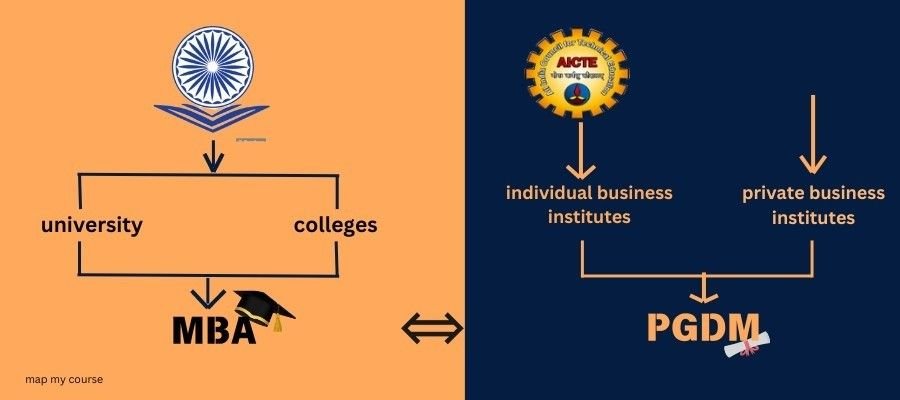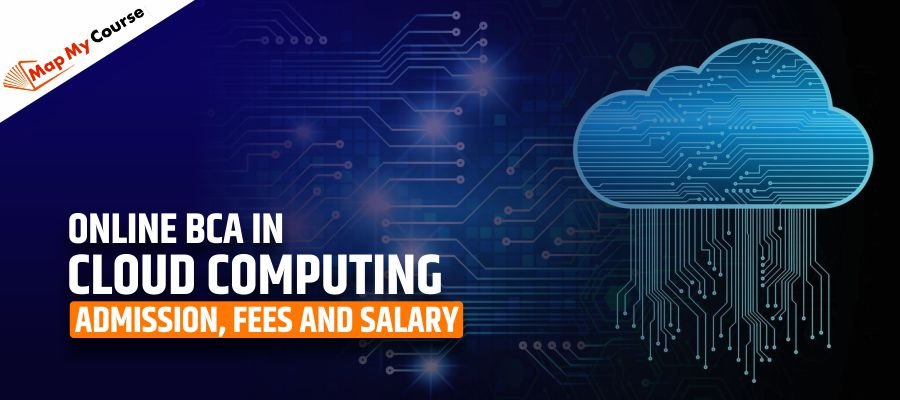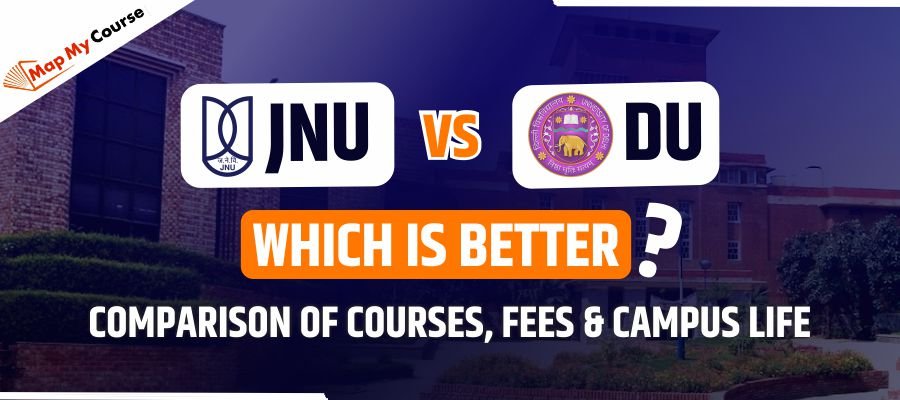Seeing that you have come across this blog, I am sure, like any other graduate, you must have been caught up in the classic debate of MBA vs. PGDM and which one will be better for you. Isn’t that right? It’s a trending topic that’s been buzzing around for ages. Both of these programs are focused on preparing the students for leadership roles but they’ve got their own merits and demerits.
And to help ease your worries, this blog will answer all of your queries. We’ll compare their perks and differences and check out how they stack up in the job market. Stick around as we help you figure out which program will be a perfect fit for your career goals!

Is MBA And PGDM Same?
Difference Between MBA Vs PGDM
Degree vs. Diploma:

- MBA is a postgraduate degree offered by universities and approved by the University Grants Commission (UGC) of India. PGDM, on the other hand, is a diploma course offered by self-financed institutions and recognized by the All-India Council for Technical Education (AICTE).
- Sometimes it can be hard to decide which course will be better for you, particularly because of the negative notions associated with diploma courses, like considering them uncreditable. However, PGDM from recognized institutions such as XLRI Jamshedpur and SPJIMR are in fact recognized all over the world and filled with practical knowledge.
- Therefore, it is important to find a program that matches your career interests. You can rest assured that both courses offer students the best opportunities for growth and success!
Curriculum:
- As for curriculum, an MBA is your standard degree program where the emphasis is placed on academics since it goes into more detail regarding the theory behind business. The syllabus is also designed by the university offering very little flexibility when it comes to curriculum.
- However, PGDM is more inclined to follow the current industrial trends. It is offered by private institutes, which makes the curriculum more industry-focused and without many constraints. This offers a huge flexibility in the course structure. Therefore, PGDM will be the right choice for you if you are looking to gain experience!
Teaching Methodologies:
- A certified PGDM program is not just about the teaching-learning in the classroom. It has both a theoretical framework and a practical approach. A significant focus of the course is on case studies which enable students to engage deeper into problems and understand how business issues operate.
- The program will engage you in extracurricular activities, social initiatives, and competitions to help build crucial soft skills. This is to make students prepared for facing the real world of business.
- You can consider an MBA to be a traditional business school where there are lectures and case analyses diving into theories. It’s focused on building a solid academic foundation and understanding the core concepts behind a business.
Course Fees:
- MBAs are more affordable. Since they’re tied to universities with government backing, the fees are often lower, making them accessible to a wider crowd.
- PGDM programs, especially those from prestigious institutions like the IIMs, can be pretty pricey. Why? That’s because they offer intensive industry interaction and up-to-date curriculums with standard placement support.
- All these features do make the cost higher, but they are way worth that money because of the extraordinary career advantages they provide to individuals.
Key Differences Between MBA And PGDM
| Parameter | MBA | PGDM |
| Recognition | UGC | AICTE |
| Course type | A master’s course | A diploma course |
| Institutions offering | Autonomous institutions, often AICTE-accredited | Technical institutes, polytechnics, community colleges |
| Eligibility | Requires a bachelor’s degree; entrance exams like CAT, XAT, GMAT | Requires a bachelor’s degree; entrance exams like CAT, XAT, GMAT |
| Course Fees | Generally higher due to the management focus and the institution’s prestige | Generally lower cost due to shorter duration and vocational nature |
| Curriculum | It does not meet the industry demands as the university creates it | Meets the industrial trends & demands |
| Career outcomes | Management roles in corporate sectors, entrepreneurship | Entry-level positions in technical fields, skilled trades |
How to select which course is better for you?
if you’re aiming for a career in management, business, or corporate leadership, an MBA is a solid choice. It provides deep business insights and valuable industry connections which often leads to higher earnings. And if you’re keen on gaining practical skills in a specific trade or technical area and want a faster, more affordable way into the workforce, a Diploma might be your best bet.
In the end, it’s all about what fits your career goals and interests best. Choose the path that aligns with where you want to go and what you’re passionate about!
Top Universities Offering MBA And PGDM Courses
| College | Fees |
| For MBA | |
| Indian Institute of Management Ahmedabad (IIM Ahmedabad) | INR 33 lakh -INR 35 lakh |
| Indian Institute of Management Bangalore (IIM Bangalore) | INR 24,50,000 |
| Indian Institute of Management Calcutta (IIM Calcutta) | INR 31,00,000 |
| For PGDM | |
| Xavier School of Management (XLRI), Jamshedpur | INR 24,00,00 -INR 25,80,000 |
| SP Jain Institute of Management and Research (SPJIMR), Mumbai | INR 24,00,00- INR 25,80,000 |
| Management Development Institute (MDI), Gurgaon | INR 24,99,00 lakhs |
Job Prospects After MBA And PGDM
For MBA
| Job | Description |
| Management Consultant | Role: Management consultants help companies on company strategy, operations, and efficiency enhancements. Average Salary: INR 12-25 LPA Top Hiring Companies: McKinsey & Company, Bain & Company, Deloitte, PwC, hiring MBA graduates |
| Investment Banker | Role: Investment bankers help organizations raise capital, manage mergers and acquisitions, and navigate financial markets.
Average Salary: INR 15-30 LPA Top Hiring Companies: Goldman Sachs, JPMorgan Chase, Morgan Stanley, Citibank, Deutsche Bank, and Barclays |
| Marketing Manager | Role: Marketing managers develop and execute marketing strategies to promote a company’s products or services.
Average Salary: INR 8-18 LPA Top Hiring Companies: Unilever, Procter & Gamble, Google, Amazon, Coca-Cola, and PepsiCo |
For PGDM
| Job | Description |
| Business Analyst | Role: play a critical role in bridging the gap between business needs and IT solutions. This role involves data analysis, process mapping, and strategic planning. Average Salary: INR 6-15 LPA Top Hiring Companies: McKinsey & Company, Bain & Company, Deloitte, PwC, hiring MBA graduates |
| Product Manager | Role: responsible for the planning, development, and execution of a product throughout its lifecycle. Average Salary: INR 12-25 LPA Top Hiring Companies: like Google, Amazon, Microsoft, Flipkart, and Paytm |
| Human Resources (HR) Manager | Role: HR managers oversee recruitment, employee relations, performance management, and organizational development. They ensure that the company attracts, retains, and develops talent, while also maintaining a positive work environment.
Average Salary: INR 8-20 LPA Top Hiring Companies: Tata Consultancy Services (TCS), Reliance Industries, ICICI Bank, Larsen & Toubro (L&T) |
FAQ
Is PGDM equivalent to an MBA?
Can I pursue PGDM after a non-business background?
Are MBA and PGDM programs online?
What’s the average salary for MBA and PGDM graduates?
While PGDM is not a degree, it’s recognized by the All India Management Association (AIMA) and the Association of Management Institutes of India (AIMI). Many employers consider PGDM and MBA equivalent for recruitment purposes.
Yes, many PGDM programs accept students from non-business backgrounds.
Some institutions offer online or part-time MBA and PGDM programs, but most are full-time.
The average salary varies depending on the institution, location, and industry, but it’s generally around 8-12 lakhs per annum.




